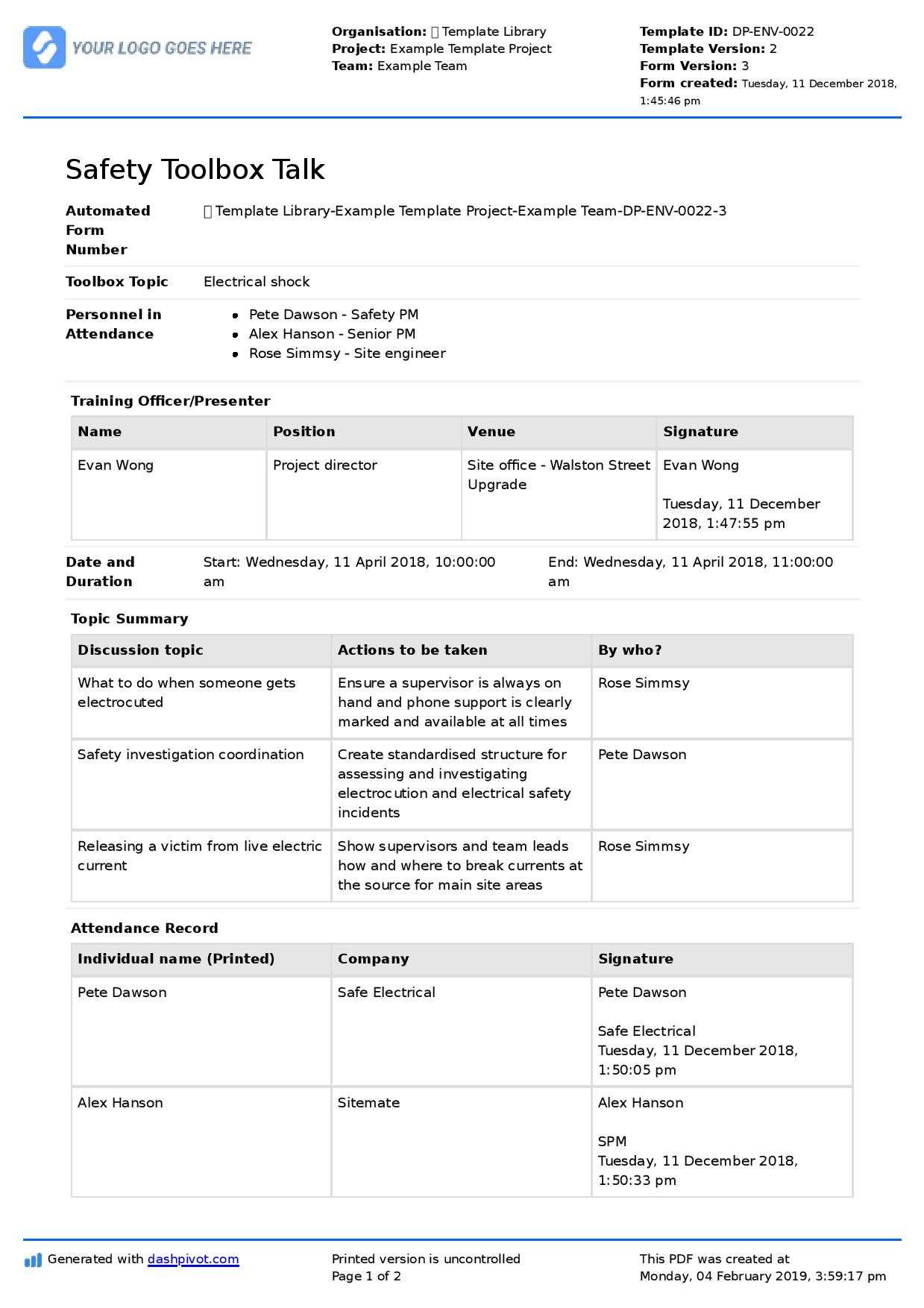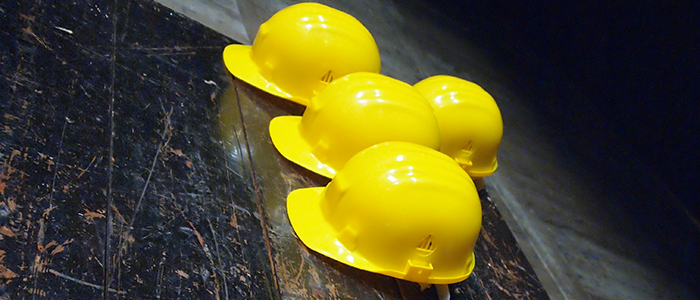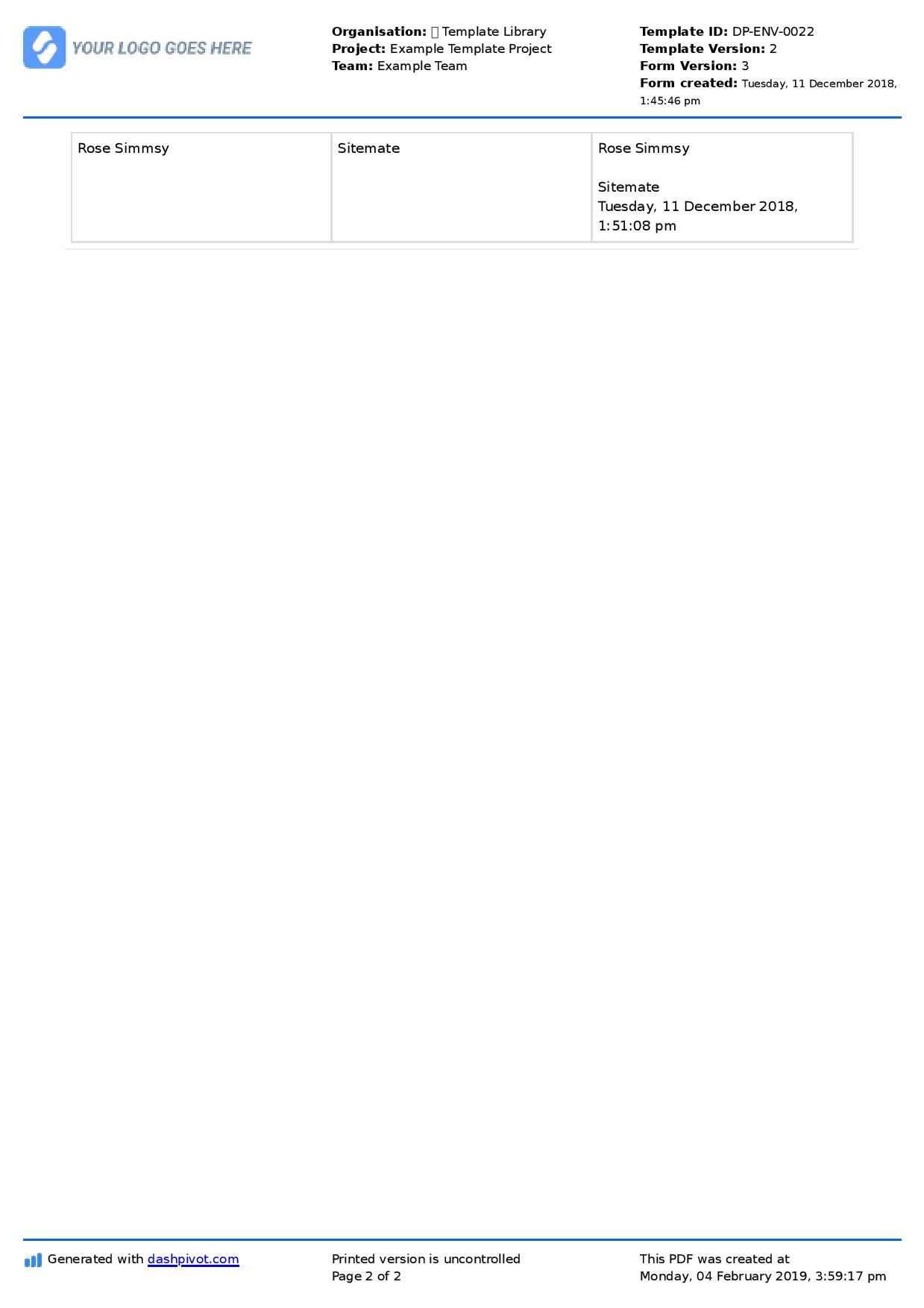Dashpivot article – daily toolbox talks
Daily Toolbox Talks
In this article, we will discuss the importance of conducting daily toolbox talks, and the secrets to running great toolbox talks on a daily basis. We also provide some free resources for you to use in running your daily safety talks.

Toolbox talks (also known as safety briefings and pre-starts) are quick safety meetings right before a shift. These talks are often conversational and usually take about 5-10 minutes, which is why they are often daily toolbox talks.
Workers discuss safety risks and potential hazards that may be present during the day's tasks, as well as strategies for mitigating these risks.
Why Are Daily Toolbox Talks Important?
By addressing daily safety concerns at the beginning of each shift, workers are better prepared to identify and address potential dangers before they become accidents. Here are some benefits of conducting daily toolbox talks in the workplace:
Address daily workplace risks
Worksites, especially in the construction industry, can change daily. New tasks, tools, equipment, and personnel changes can potentially introduce hazards. Doing daily toolbox talks can help reduce safety risks by addressing issues daily.
Toolbox talks promote a safety culture
It's always good to be reminded of the importance of safety daily. As time goes on, it helps cultivate a culture of safety that can be embedded in the workers' minds.
Boosts worker confidence on a daily basis
Daily toolbox talks enhance team collaboration and ensure open communication among workers. This can boost employee morale and make them feel that their overall well-being is prioritised.
Toolbox talks can correct complacency
Since tasks can become too repetitive, workers can be complacent, and safety procedures may be overlooked. These toolbox daily talks serve as a reminder that safety protocols must be adhered to at all times.
Daily Toolbox Talk Topics for Industries
Before a toolbox talk, selecting the right topics to talk about ensures safety and strengthens compliance. These topics may vary from one industry to another, and keep in mind that some are more relevant in specific work environments. Here are some topics to explore according to the industry type:
General Safety Topics
Safety is a topic common to all industries, and this must be emphasised. The team will discuss personal protective equipment (PPE) usage, fire safety, first aid basics, electrical safety, and chemical handling in their daily toolbox talks. More specific safety topics may arise depending on the industry.
Construction Safety Toolbox Talk Topics
On a daily basis, construction workers are exposed to various health risks and safety hazards on site. If these risks are not carefully addressed, injuries, accidents, or even fatalities may occur. Fall prevention and protection, tool safety & maintenance, and trench & excavation hazards are some of the potential topics that may be discussed in a construction toolbox talk.
Seasonal and Environmental Topics
Seasons change, which can affect workers' performance, and it’s always good to be reminded of the proper safety measures when crises arise. For hot summer months, topics like heat stress and hydration and sun and UV protection may be discussed. Winter months also pose risks that may harm workers, and topics like cold stress and frostbite prevention can be very beneficial. For outdoor work environments, it’s good to discuss topics like wildlife and pest encounters and how to avoid them in daily toolbox talks.
Behavioural Focus Topics
Employees, especially those working directly with customers, can experience stress and burnout, which can impact their mental health. Useful topics like stress management and mental health on the job can also be discussed. As a result of stress, workers may also turn to alcohol and substance abuse to cope. Topics like how to manage alcohol and substance abuse can also be included in daily toolbox talks.
Human Resources Topics
The workforce is the company’s biggest asset, and it is important they are well taken care of. Topics like eye safety, hearing protection, and creating a culture of teamwork are healthy practices that can also be discussed in the daily toolbox talks.
Emerging Toolbox Talk Topics
With the rapid advancement of technology, there are a lot of emerging topics that can be included, like cybersecurity basics, drones in the workplace, and virtual reality & augmented reality safety.
The list of topics can go on based on other industries, and it’s good to remember that there are topics unique to them. These topics can also be combined or split to fit your organisation’s needs.
Remember, always keep the daily toolbox talks relevant and ensure open communication with the workers.
How Daily Toolbox Talks Are Done
Now we know why we do toolbox talks; let’s learn how to do it effectively. When done correctly, daily toolbox talks will give you a safer and better workplace in general. Here’s how you can do daily toolbox talks:
Preparation
Before starting your daily toolbox talk, it is important to prepare what you need. Firstly, select a designated location and time for these discussions to take place. Secondly, there must be a list of topics that are relevant to today’s work, current events, or even the most recent incidents. Also prepare any needed materials like safety data sheets, equipment, diagrams, or presentations to make your daily toolbox talk a good one.
Start promptly
Daily toolbox talks take only 5-10 minutes, and starting on time ensures all the relevant topics are covered. Beginning promptly also sets a positive tone for the rest of the shift, and team members are more likely to prioritise attending these safety meetings.
Engage workers during toolbox talks
Toolbox talks are brief, but that doesn’t mean they cannot be fun. Engage the workers by starting with a question or a brief anecdote to make them listen while maintaining eye contact. As mentioned earlier, visual aids can help add colour to your daily toolbox talks.
Present concisely with intent
Given that the topics have already been outlined, the presentation flow should be straightforward. Always stick to the main points and avoid using jargon or terms that are difficult to comprehend. Keep it straight and simple, and remember that everything must be clear.
Let the workers participate
The purpose of daily talks is to ensure workers are heard and to encourage them to ask questions. Also, ask if there is feedback or topics they want to discuss in the future.
Document daily toolbox talks
Daily toolbox talks are better when there is documentation in place. Documentations like attendance sheets can help track who received the information, and a topic log ensures all the important points are noted while avoiding repetitions.
Provide action items
Another purpose of conducting daily toolbox talks is to ensure that action is taken when issues or incidents arise in the workplace. Some workers learn better by doing actions rather than writing them on paper, so it is better to remember them as they go on their shifts.
Now that you know some useful tips on how to do daily toolbox talks right, it’s time to put them into practice. Here is an example of how to run a daily toolbox talk:

Run daily toolbox talks with this form for free
Create standardised daily toolbox talks quickly and easily
The admin around documenting a daily toolbox talk can be tedious and time-consuming if you don't have a standardised daily toolbox talk format and structure.
You can use this digital toolbox talk template to run daily toolbox talks to make filling out all the information you need faster and easier. This also comes pre-built with sections for project information, date, topic, feedback/questions asked during the toolbox talk, attendee sign-on, and approval sign-off.
Furthermore, you can also customise your daily toolbox talk with the drag-and-drop form builder to add any sections, like photos or videos, or any fields you need specific to your daily topic or project deficiencies.
Spend less time on daily toolbox talks and more time on work by building digital processes
Using a toolbox talk app can help to save time organising and running daily toolbox talks. Automating your workflows can help you queue up multiple toolbox talks ahead of time on the topic you want to cover, push them to in progress once they're ready to go, and mark them as complete when they get signoff approval.
Easily conduct daily toolbox talks on-site and share (as PDF or CSV files) with just a few clicks using your mobile phone with our app. Take daily toolbox talk attendance quickly with QR code scanning from employees' phones to immediately add their attendance to the toolbox talk report.
You can also use the register and timeline views to review completed toolbox talks, as this will reduce double handling and help you see what topics you've already covered and what topics you've missed covering.

Near Miss Reporting template
Keep your site safer by making your near miss reporting procedure safe and streamlined.

Permit to Work template
Digitise and automate the permit approval process for any safety permit to work with this flexible template.

Job Hazard Analysis template
Easily complete a JHA on any device, and then keep all of your job hazard analyses neatly organised and searchable.
